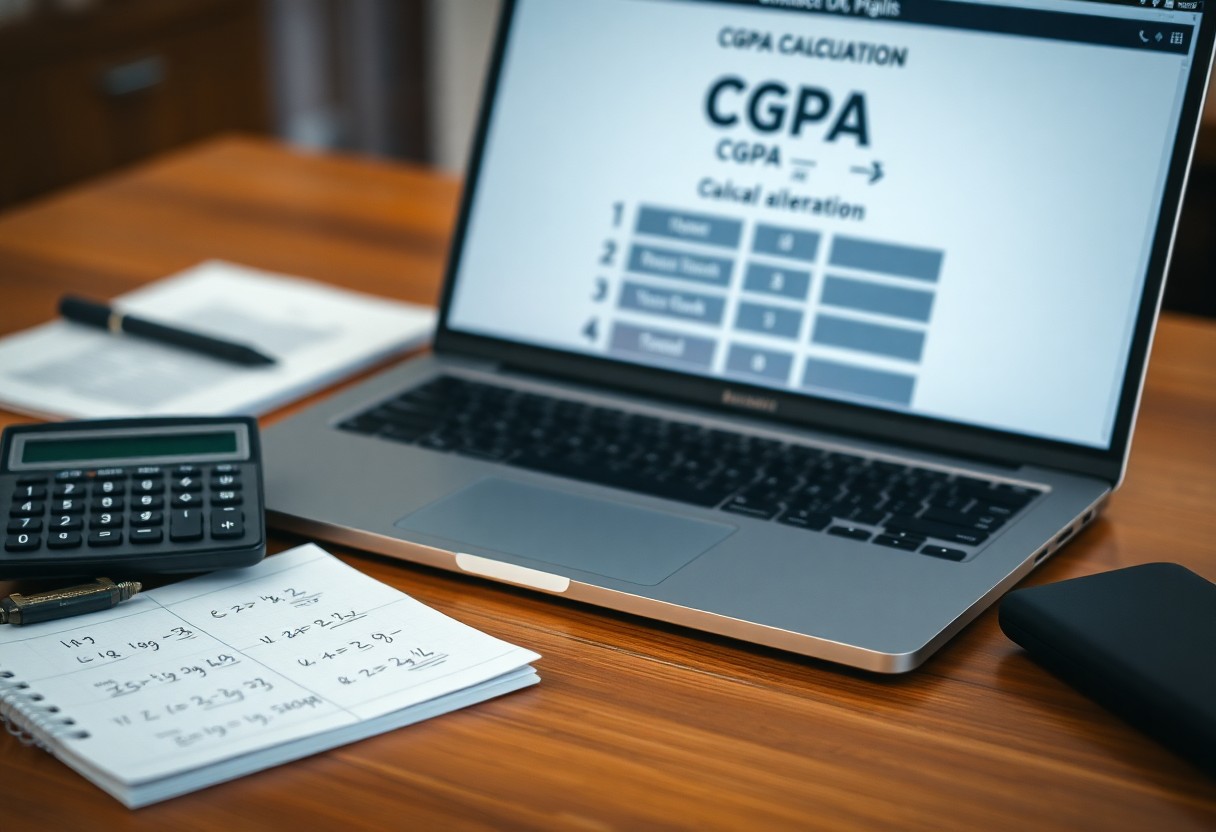Many students find it challenging to understand how to convert their Cumulative Grade Point Average (CGPA) into a percentage and, as a result, may miss out on opportunities that depend on their academic performance. By following this simple guide, you will learn the step-by-step process to effectively calculate your CGPA in percentage. This knowledge not only empowers you academically but also enhances your qualifications when seeking employment or further studies, ensuring you don’t underestimate the value of your hard work.
Table of Contents
Key Takeaways:
- Understanding CGPA: CGPA stands for Cumulative Grade Point Average, a measure of a student’s academic performance on a scale typically from 0 to 10.
- Conversion Formula: To convert CGPA to percentage, use the formula: Percentage = (CGPA – 0.5) x 10. This formula may vary slightly based on specific institution guidelines.
- Grade Point Values: Be aware that each grade may correspond to a specific point value, which can affect the overall CGPA calculation based on credit hours and course weight.
Understanding CGPA
To grasp the concept of CGPA, or Cumulative Grade Point Average, it serves as a comprehensive measure of your academic performance across multiple semesters or academic periods. This metric simplifies the evaluation of your grades and provides a standardized method for assessing your overall educational progress. By calculating CGPA, you gain insight into how well you are doing in your studies, enabling you to make informed decisions about your educational path.
Definition of CGPA
An important metric in academic systems, CGPA represents the weighted average of the grade points earned in your courses over a given period. Each course typically carries a specific credit weight, which contributes to your overall average. Understanding how CGPA is determined can give you a clearer picture of your academic standing.
Importance of CGPA in Academics
You may often encounter the term CGPA in academic discussions, and its significance cannot be understated. CGPA impacts your eligibility for numerous opportunities, such as scholarships, internships, and entrance into graduate programs. Institutions often use this metric as a benchmark to assess your academic performance compared to peer students.
Definition of CGPA extends beyond mere numerical values; it also informs various aspects of your academic journey. A high CGPA can enhance your chances of securing scholarships and accessing prestigious academic programs. Conversely, a low CGPA can limit opportunities and affect your confidence in your academic abilities. Ultimately, understanding and striving to improve your CGPA can lead to a brighter academic future and more career options down the line.
How to Calculate CGPA
The process of calculating your Cumulative Grade Point Average (CGPA) is straightforward and vital for understanding your academic performance. CGPA provides a comprehensive overview of your grades across subjects, helping you gauge your overall success in your studies. With a few simple calculations, you can convert your grade points into a CGPA value that reflects your academic achievements.
Step-by-Step Guide
Any student can follow this simple step-by-step guide to calculate their CGPA:
| Step | Description |
| 1 | List all your grades and the corresponding credit hours for each course. |
| 2 | Multiply each grade point by the credit hours for that course. |
| 3 | Add the total points earned and total credit hours. |
| 4 | Divide the total points by the total credit hours to get your CGPA. |
Common Calculation Methods
Clearly, CGPA calculation can vary based on different educational institutions, leading to varied methods. Many schools utilize a standard 10-point or 4-point grading scale. Understanding your institution’s methods is important for accurate calculations.
Another effective approach is to use software tools or online calculators that simplify CGPA computations. These platforms automatically handle the arithmetic, allowing you to input grades and credit hours effortlessly. They can help ensure accuracy by clearly defining formulas and methods used in calculations. However, be cautious while entering your data to avoid errors that may influence your final CGPA.Always confirm calculations with your institution’s guidelines to maintain validity.
Converting CGPA to Percentage
Not all institutions maintain the same grading systems, making it necessary for you to convert your CGPA to a percentage accurately. This conversion helps you understand your academic performance and is often required for applications, job opportunities, and further studies. Appropriate conversion will reflect your standing more clearly, ensuring you represent your achievements effectively.
Formula for Conversion
Even though the specific formula may vary between institutions, the most common method involves multiplying your CGPA by a constant factor—typically 9.5 or 10, depending on your college’s grading scale. For instance, if your CGPA is 8.0, you may convert it to percentage by using the formula: Percentage = CGPA × 10.
Examples of Conversion
You can apply the conversion formula with various CGPA values to see how it works practically. For example, if your CGPA is 7.5, applying the common formula gives you a percentage of 75%. Similarly, a CGPA of 9.0 results in 90%. This direct correlation helps in establishing a clear understanding of your academic performance.
This conversion process becomes increasingly important when applying for scholarships or jobs, as many employers and educational institutions request percentage scores. Understanding the numerical value associated with your CGPA helps you advocate for yourself more effectively. Each point in your CGPA can significantly impact your overall academic representation, so ensure accuracy during conversion for the best possible display of your achievements.
Tips for Improving CGPA
Many students struggle to maintain a high CGPA due to various factors. To boost your performance, consider these vital tips:
- Set clear and achievable academic goals.
- Engage actively in class discussions.
- Seek help from professors and peers when needed.
- Utilize study groups for collaborative learning.
- Stay organized with a study schedule.
This proactive approach can significantly enhance your academic outcomes.
Study Habits and Strategies
Clearly, effective study habits are vital for improving your CGPA. Establish a consistent routine that incorporates regular revisions, active participation in lectures, and efficient note-taking techniques. Leverage resources such as online tutorials and educational platforms to supplement your learning. Tailor your study strategies to align with your strengths and weaknesses, ensuring a balanced approach to all subjects.
Time Management Skills
Tips for enhancing your time management skills include prioritizing tasks and breaking them into manageable segments. Use techniques such as the Pomodoro Technique to maintain focus while allowing for regular breaks. Create a daily or weekly planner to allocate specific times for assignments and study sessions to avoid last-minute cramming and late submissions.
Improving your time management skills can significantly influence your academic success. By setting deadlines, blocking distractions, and adhering to a structured schedule, you can increase productivity and reduce anxiety. Strong time management allows you to devote adequate attention to each subject, leading to improved grades and a higher CGPA, ultimately paving the way for a successful academic career.

Factors Affecting CGPA
Once again, understanding the various factors affecting CGPA can help you improve your academic performance. The key factors include:
- Course difficulty levels
- Weightage of subjects
- Your attendance
Recognizing these factors can assist you in strategizing both your studies and exam preparations.
Course Difficulty Levels
Levels of difficulty in your courses play a significant role in your overall CGPA. More challenging subjects typically require more effort and time, which can impact your overall performance.
Weightage of Subjects
An important aspect you should consider is the weightage of subjects in your CGPA calculation. Different subjects have varying levels of weightage based on their credit hours or significance in your curriculum. This means that performing well in subjects with higher weightage can significantly boost your CGPA. Conversely, doing poorly in these subjects can greatly undermine your overall score, making it vital to allocate your study time effectively.
With an understanding of this concept, you can prioritize your study habits to focus on high-weightage subjects first. Monitoring your grades in these key areas is necessary for maintaining a solid CGPA. Additionally, balancing your efforts across all subjects helps to avoid potential pitfalls, especially during examinations. Thus, strategizing your study plan can make a substantial difference in your academic outcomes.

Common Mistakes to Avoid
All students should be aware of common pitfalls when calculating CGPA percentage. Failing to recognize these mistakes can lead to incorrect assessments of your academic performance, which may have implications for future opportunities, including scholarships and job applications.
Misunderstanding Grade Systems
For many, grade systems can vary significantly from one institution to another, causing confusion. Be sure to familiarize yourself with the specific grading scale your institution uses and how it translates into CGPA, as misinterpretations can lead to inaccurate CGPA calculations.
Neglecting Calculation Accuracy
Even minor errors in your calculations can have a significant impact on your CGPA percentage. Always double-check your math and ensure that you’re using the correct formulas. Ensure that you accurately input your grades and corresponding credits to avoid miscalculations.
Misunderstanding the significance of accurate calculations can lead to an inflated or deflated CGPA percentage, which alters how you perceive your academic standing. Be diligent; small mistakes, such as errors in addition or division, can drastically affect your results. Always cross-verify your figures and seek assistance if you are unsure about any aspect of the calculation process. A precise understanding of your actual CGPA can empower you to make informed decisions regarding your academic journey.
Final Words
With this in mind, calculating your CGPA in percentage form can be straightforward. You simply need to multiply your CGPA by the conversion factor specific to your institution, typically 9.5 or 10, depending on the grading system used. This method ensures you accurately assess your academic performance. For further assistance, you might find it helpful to utilize an Online CGPA to Percentage Converter for quick conversions. By staying informed about your CGPA, you can better understand your academic standing and make informed decisions for your future.
Q: How is CGPA calculated for a course?
A: CGPA (Cumulative Grade Point Average) is calculated by taking the total credit points earned in all the subjects and dividing it by the total credits of those subjects. To compute it, follow these steps: first, find the grade point for each subject by multiplying the grade obtained by the subject’s credit value. Next, sum all the earned credit points and divide it by the total credits for that semester or academic year. This will give you the CGPA, which is usually expressed on a scale of 10.
Q: How can CGPA be converted into percentage?
A: To convert your CGPA into percentage, a standard formula can be applied: Percentage = (CGPA – 0.75) × 10. This formula is commonly used in many educational institutions, but it’s advisable to check specific guidelines as different institutions might have slightly varying conversion methods. This conversion gives you a percentage that reflects your academic performance in a more familiar format.
Q: Are there any variations in CGPA calculation across different education systems?
A: Yes, CGPA calculation methods can vary significantly across different education systems and institutions. Some might have different grading scales or weightage for various subjects. For instance, while one institution may assign grades on a 4-point scale, another might use a 10-point scale. It’s important to consult the specific grading policy of your school or university to ensure you understand how to accurately calculate your CGPA and convert it to percentage.